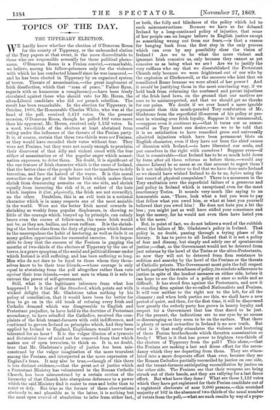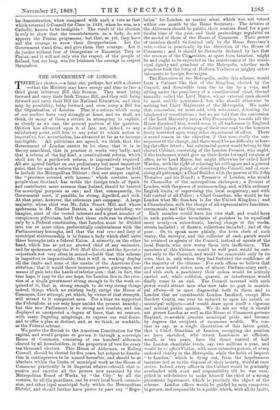TOPICS OF THE DAY.
THE TIPPERARY ELECTION.
WE hardly know whether the election of O'Donovan Rossa for the county of Tipperary, or the unbounded elation of the Tory papers at that event, is the more discreditable to those who are responsible severally for these political pheno- mena. O'Donovan Rossa is a Fenian convict, —remarkable, we believe, among his fellow-prisoners only for the violence with which he has conducted himself since he was immured,— and he has been elected in Tipperary by an organized system of terror. Threats of assassination,—the great implement of Irish disaffection, which that "man of peace," Father Ryan, regards with so humorous a complacency,—have been freely circulated against those who should vote for Mr. Heron, the ultra-Liberal candidate who did not preach rebellion. The result has been remarkable. In the election for Tipperary, in October, 1866, the Honourable Charles White, who was at the head of the poll, received 3,419 votes. On the present occasion, O'Donovan Rossa, though he polled 102 votes more than his opponent, Mr. Heron, received only 1,132 votes. In a word, two-thirds of the electors at least abstained from voting under the influence of the threats of the Fenian party. It is, of course, certain that these two-thirds were not Fenians, or they would have recorded their votes without fear. They were not Fenians, but they were not manly enough to proclaim their disavowal of that silly and violent creed with the fear either of assassination or of the popular anger which assassi- nation expresses, to deter them. No doubt, it is significant of the one feature of Irish character which is the curse of Ireland, that the better class of the people have not the manliness to defy terrorism, and face the hatred of the worse. It is this moral cowardice on the part of the better Irish which makes them shrink from denouncing assassins on the one side, and shrink equally from incurring the risk of it, or rather of the hate which inspires it (for, physically, the Irish are not cowardly), on the other. Doubtless, this is an evil trait in a national character which is in many respects one of the most amiable in the world. Were not the better Irish moral cowards in shrinking so weakly from popular displeasure, in showing so little of the courage which, buoyed up by principle, can calmly brave even the curses of fellow-men, the worse Irish would not be, as they are, bullies, and even ruffians. It is the shrink- ing of the better class from the duty of giving pain which fosters in the unscrupulous the habit of hectoring, as well as finds it so many golden opportunities for successful exercise. It is impos- sible to deny that the success of the Fenians in gagging the mouths of two-thirds of the electors of Tipperary by the use of terror, is a grave symptom of the social and political disease under which Ireland is still suffering, and has been suffering so long. Men who do not dare to be loyal to those whom they them- selves know to be their true friends,—whose courage is only equal to abstaining from the poll altogether rather than vote against their true friends,—are not men to whom it is safe to entrust the power of self-government.
Still, what is the legitimate inference from what has happened? Is it that of the Standard, which points out with wicked delight that Mr. Gladstone takes nothing by his policy of conciliation, that it would have been far better for him to go on in the old track of refusing every Irish and Catholic demand which was disagreeable to English and Protestant prejudice, to have held to the doctrine of Protestant ascendancy, to have rebuffed the Catholics, received the com- plaints of the Irish tenant-farmers with cold indifference, and continued to govern Ireland on principles which, had they been applied by Ireland to England, Englishmen would never have tolerated for an hour? It is the vulgar illusion of a tyrannic and dictatorial tone of mind not far removed from that which makes use of open terrorism, to think so. It is, no doubt, true that Mr. Gladstone's policy of justice has been mis- construed by the vulgar imagination of the more truculent among the Fenians, and interpreted as the mere expression of England's fears. It may also be true,—though of this there is less distinct evidence,—that the great act of justice which a Protestant Ministry has volunteered to the Roman Catholic Church, has been misconstrued by a certain section of the hierarchy of that Church into obsequious deference to a power which the said Ministry find it easier to coax and bribe than to resist or defy. But true as the former of these observations obviously is, and plausible as is the latter, it is nothing but the most open avowal of absolutism to infer from either fact, or both, the folly and blindness of the policy which led to such misconstructions. Because we have so far debased Ireland by a long-continued policy of injustice, that some of her people can no longer believe in English justice except as something wrung out from our fears,—is that a reason. for hanging back from the first step in the only process. which can ever by any possibility clear the vision of Ireland Are we to be what the more violent and, ignorant Irish conceive us, only because they cannot as yet conceive us as being what we are Are we to justify the very ruffians who say that we disestablished the Protestant Church only because we were frightened out of our wits by the explosion at Clerkenwell, or the sneerers who hint that we conciliated Rome because we were afraid of her power? And it would be justifying them in the most convincing way, if we held back from reforming the confessed and patent injustices of the Irish land laws, on the ground that our motives are sure to be misinterpreted, and that we should get no thanks for our pains. We doubt if we ever heard a more ignoble argument than this much-paraded Tory confutation of Mr. Gladstone from the superficial ill-success of his policy at pre- sent in winning over Irish loyalty. Suppose it be unsuccessful, —suppose even it continues so,—that it turns out as unsuc- cessful as Tory heart can desire,—are we to be told that it is no satisfaction to have remedied gross and universally admitted injustices which have been permanent blots on English character, even if they have not been the chief causes of disunion with Ireland,—to have liberated our souls, and put ourselves in the right with ourselves ? Suppose even.—if that is conceivable—that Ireland has to be as much held down by force after all these reforms as before them,—would any sincere Liberal be so mean as on that account to regret them t Is it not infinitely better to feel that we have done unto Ireland as we should have wished Ireland to do to us, before using the last resort of physical compulsion ? There is a meanness in the Tory exultation over the superficial failure of a generous and just policy in Ireland which is exceptional even for the most reactionary Tories. It sounds very much like saying to an honourable man, There, look what a fool you were to pay that fellow what you owed him, or what at least you yourself believed that you owed him! He does not hate you a bit the- less ; you might just as well have stifled your conscience and kept the money, for he would not even then have hated you. a bit the more.'
But, in point of fact, we do not believe a word of the rubbish- about the failure of Mr. Gladstone's policy in Ireland. That policy is, no doubt, passing through a trying phase of its history. It has to prove to all Ireland that it is not a policy of fear and dismay, but simply and solely one of spontaneous justice ;—that, as the Government would not be deterred from just reforms by the howl of the Tories or the ultra-Protestants, so now they will not be deterred from firm resistance to sedition and anarchy by the howl of the Fenians or the threats of Catholic priests. The Government must gain the full respect of both parties by its steadiness of policy, its resolute adherence to justice in spite of the loudest menaces on either side, before it can hope to see the fruits of a policy at once so noble and so difficult. It has stood firm against the Protestants, and now it is standing firm against the so-called Nationalists and Fenians. It will veer neither to the right nor to the left, for all the clamour ; and when both parties see this, we shall have a new period of quiet, and then, for the first time, it will be discovered how greatly the orderly party has grown in hearty loyalty and respect for a Government that has thus dared to be just. For the present, the indications are to our eyes by no means so discouraging as they seem to be on the surface. That there is plenty of moral cowardice in Ireland is no new truth. But what is it that really stimulates the violence and hectoring of these Fenian brotherhoods which threaten assassination so freely ? What is it that has power to frighten two-thirds of the electors of Tipperary from the poll ? This alone,—that the Fenians are making a last and fierce effort for the ascen- dancy which they see departing from them. They are stimu- lated into a more desperate effort than ever, because they see the Roman Catholics partially reconciled by justice on one side, and the tenant-farmers anticipating reconciliation by justice on the other side. The Fenians see that their weapons are being struck out of their hands, and they are rallying for a last fierce effort. But what have they done? What are these 1,132 votes which they have got registered for their Fenian candidate out of a registered electorate of near 9,000 persons,—this wretched majority of 102 in the absence of two-thirds of the usual number of voters from the poll,—what are such results by way of a popu-
lar demonstration, when compared with such a vote as that which returned O'Connell for Clare in 1828, when he was, as a Catholic, known to be ineligible? The result of the election is only to show that the tenant-farmers, as a body, do not approve the Fenian programme, but that, as yet, they have -not the courage to avow their disapprobation. Let the Government stand firm, and give them that courage. Let it do justice without fear of Orangeman or Romanist, Tory or Fenian, and it will not only win the respect of the people of Ireland, but, ere long, win for Irishmen the courage to respect themselves.



































 Previous page
Previous page